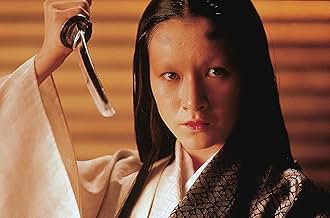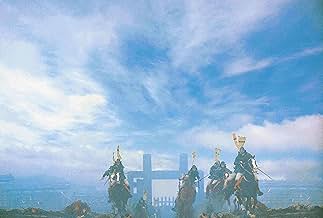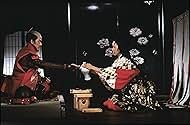No Japão medieval, um senhor feudal decide abdicar e entregar seus domínios aos seus três filhos. Mas ele não é capaz de ver que esses novos poderes irão corrompê-los e levá-los a enfrentar ... Ler tudoNo Japão medieval, um senhor feudal decide abdicar e entregar seus domínios aos seus três filhos. Mas ele não é capaz de ver que esses novos poderes irão corrompê-los e levá-los a enfrentar um ao outro, e contra ele.No Japão medieval, um senhor feudal decide abdicar e entregar seus domínios aos seus três filhos. Mas ele não é capaz de ver que esses novos poderes irão corrompê-los e levá-los a enfrentar um ao outro, e contra ele.
- Direção
- Roteiristas
- Artistas
- Ganhou 1 Oscar
- 30 vitórias e 23 indicações no total
Mansai Nomura
- Tsurumaru
- (as Takeshi Nomura)
Resumo
Reviewers say 'Ran' is celebrated for its epic scale, masterful direction, and stunning visuals. Adapted from Shakespeare's 'King Lear,' it is lauded for its intricate narrative, powerful performances by Tatsuya Nakadai and Mieko Harada, and deep exploration of power, corruption, and betrayal. The cinematography and battle scenes are noted for their grandeur. Some find its slow pace and long runtime challenging, yet it is often hailed as one of Kurosawa's finest works.
Avaliações em destaque
One of the last great films directed by Akira Kurosawa. A father gives his land and his power to his three sons. They turn against each other and against their father.
Based on Shakespeare's King Lear 'Ran' is a very good film. It was very expensive and you can see that. Over ten years Kurosawa was busy on this project and in 1985 it was finally there. Very well made, with beautiful costumes, music and cinematography, a great direction and some good performances. Although I think Kurosawa has done better ('Rashomon', 'Ikiru', 'Yojimbo' and of course 'Shichinin no Samurai') 'Ran' definitely belongs to his best.
Based on Shakespeare's King Lear 'Ran' is a very good film. It was very expensive and you can see that. Over ten years Kurosawa was busy on this project and in 1985 it was finally there. Very well made, with beautiful costumes, music and cinematography, a great direction and some good performances. Although I think Kurosawa has done better ('Rashomon', 'Ikiru', 'Yojimbo' and of course 'Shichinin no Samurai') 'Ran' definitely belongs to his best.
Ran takes viewers to a place they would rather not explore on their own. In a world of cruelty, Kurasowa has shown how the moments within the horror can have beauty. Shakespeare wrote King Lear as a mirror on the human condition. We do not have to be kings and princesses to identify with the father's desire for the well being of his children, even if his own life was one of cruelty and pain. We see this theme throughout great literature and film. What Ran has done is to provide the viewer with many small moments within the pain to realize the beauty. Even the moment of epiphany for Hidetora, when his actions achieve his madness, is one of surpassing beauty. As the storm rages outside the small house of the prince he blinded, whose parents he killed, whose sister he forcibly married off, the simple sounds of the flute provide an intense focus on the here and now. It is at this moment when Hidetora recognizes that he himself sowed the seeds of his own destruction. There is no dialogue, no swashbuckling, just the terrible beauty of the music. As with many of Kurasowa's films, despite their epic scope, it is the small paint strokes that make up the master's canvas.
I would agree with Ebert's review on a point, that Akira Kurosawa, legendary director of such samurai classics as Seven Samurai, Yojimbo, Hidden Fortress, and Kagemusha, as well as human dramas like Rashomon, The Lower Depths, and Red Beard, could really best direct this film in his old age. There's something about his version of the doomed King Lear of Shakespeare, his Lord Hidetora Ichimonji that could be truly captured by someone in old age. Not to say that directors can't make great films when they're young, or in middle age, about a man in the dark days of the golden years (About Schmidt, Tokyo Story, Bob Le Flambeur, and Kurosawa's own Ikiru come to mind). But it's clear that Kurosawa must've seen or felt or understood at least an element of Hidetora's character, something that goes beyond tragedy that is stuck with all who are mortal.
At one point when Hidetora is in a wandering, dazed state he says "I am lost", to which his companion/caretaker Kyoami responds "Such is the human condition." Was Kurosawa lost as an artist and filmmaker as he tried to get his epic (which at the time of it's filming was the most expensive Japan had seen, and got some extra backing from outside European backers) off the page and onto celluloid? Hard to say, but the end result displays that even in his later days he could create a work so wonderful, so sad, so brutal, and so human that it will remain timeless. If Kurosawa deserves praise for look of the film, the pacing, the editing, every single painstakingly storyboarded (painted) shot, and his direction with the two battle sequences as well as with the quieter, more compelling scenes with the actors, the man who plays Hidetora deserves some as well (like any production of King Lear, including Godard's wild treatise with Burgess Meredith in the lead role, the actor is as important as the writer). Tatsuya Nakadai, who had roles in past Kurosawa films as a young man in Yojimbo (the gunslinger) and Sanjuro (the opponent), is awe-inspiring.
Early in the film, after a mind-shattering dream, his character decides to split up his kingdom unto his three sons (Jiro, Saburo, and getting the first castle and all control, Taro), he still feels in control, and has the look of a Lord with just the right level of stubbornness and, unfortunately, naivety. Then, as everything he owns crumbles before him, there is one scene that struck me as remarkable, and then for the rest of the film I couldn't take my eyes off of Nakadai whenever he was on screen. It involves the first battle sequence, in which one of his son's comes to take over a castle, and killing all of Hidetora's men. Look at Nakadai in the scene where he's sitting down stone-faced amid the chaos going on outside, and then as he somehow manages to walk out, the fellow soldiers making way for him. He then sees one of his sons, the betrayer, and he doesn't say a word- he's already decided that his son Taro has gone too far with his position, as he rules over his domain and scares the peasants right out of the picture- and he simply walks away, as his family continues to crumble under corruption of the mind and heart.
It's a sequence like that though, where the great Lord makes such a radical change, where Kurosawa and Nakadai have some of their greatest time ever on a screen. As the filmmaker treats the battle, up to a point, like a feudal-Japanese version of a Eisenstein battle (no talk, no sound effects, just the eerie, sorrowful score here applied by Toru Takemitsu) with devastation and visceral nature taken to a poetic, thoughtful level, the actor's eyes and body language are, well, indescribable almost. And if Nakadai gives the finest male performance of the film, credit is equally due to the pivotal female character, Lady Kaede (Mieko Harada), who is like a Lady Macbeth taken to the next level. This is a character that's seen Lord Ichimonji destroy his castle when she was young, and now that she has her son(s) right in the palm of her hand, she'll have her revenge in guise of ego-feeding.
I may not be able to recommend Ran on one level, despite it being on the painter's equivalent of a splendorous, seething portrait of royalty. Kurosawa takes his time telling the story, and to some it might even feel longer than his epic Seven Samurai. This is a work heavy on emotional nuance, on how the characters (in particular Hidetora) look unto their surroundings, how the presence of destruction and war and slayings are traumatic as opposed to being 'cool' in a stylistic way. If you're looking for a slam-bang action thriller look, elsewhere. But if you're looking for a mature film about life, death, loss, and the bonds that are kept within families, the mind, and how we accept and give forgiveness (a blind character named Lord Tsurumaru is stunning from a certain point of view), this is it. As well for the Shakespeare fan it's an absolute must-see, and it may even turn some onto Shakespeare's classic due to the fact that this film, much like Throne of Blood, contains none of the language style used in the source.
At one point when Hidetora is in a wandering, dazed state he says "I am lost", to which his companion/caretaker Kyoami responds "Such is the human condition." Was Kurosawa lost as an artist and filmmaker as he tried to get his epic (which at the time of it's filming was the most expensive Japan had seen, and got some extra backing from outside European backers) off the page and onto celluloid? Hard to say, but the end result displays that even in his later days he could create a work so wonderful, so sad, so brutal, and so human that it will remain timeless. If Kurosawa deserves praise for look of the film, the pacing, the editing, every single painstakingly storyboarded (painted) shot, and his direction with the two battle sequences as well as with the quieter, more compelling scenes with the actors, the man who plays Hidetora deserves some as well (like any production of King Lear, including Godard's wild treatise with Burgess Meredith in the lead role, the actor is as important as the writer). Tatsuya Nakadai, who had roles in past Kurosawa films as a young man in Yojimbo (the gunslinger) and Sanjuro (the opponent), is awe-inspiring.
Early in the film, after a mind-shattering dream, his character decides to split up his kingdom unto his three sons (Jiro, Saburo, and getting the first castle and all control, Taro), he still feels in control, and has the look of a Lord with just the right level of stubbornness and, unfortunately, naivety. Then, as everything he owns crumbles before him, there is one scene that struck me as remarkable, and then for the rest of the film I couldn't take my eyes off of Nakadai whenever he was on screen. It involves the first battle sequence, in which one of his son's comes to take over a castle, and killing all of Hidetora's men. Look at Nakadai in the scene where he's sitting down stone-faced amid the chaos going on outside, and then as he somehow manages to walk out, the fellow soldiers making way for him. He then sees one of his sons, the betrayer, and he doesn't say a word- he's already decided that his son Taro has gone too far with his position, as he rules over his domain and scares the peasants right out of the picture- and he simply walks away, as his family continues to crumble under corruption of the mind and heart.
It's a sequence like that though, where the great Lord makes such a radical change, where Kurosawa and Nakadai have some of their greatest time ever on a screen. As the filmmaker treats the battle, up to a point, like a feudal-Japanese version of a Eisenstein battle (no talk, no sound effects, just the eerie, sorrowful score here applied by Toru Takemitsu) with devastation and visceral nature taken to a poetic, thoughtful level, the actor's eyes and body language are, well, indescribable almost. And if Nakadai gives the finest male performance of the film, credit is equally due to the pivotal female character, Lady Kaede (Mieko Harada), who is like a Lady Macbeth taken to the next level. This is a character that's seen Lord Ichimonji destroy his castle when she was young, and now that she has her son(s) right in the palm of her hand, she'll have her revenge in guise of ego-feeding.
I may not be able to recommend Ran on one level, despite it being on the painter's equivalent of a splendorous, seething portrait of royalty. Kurosawa takes his time telling the story, and to some it might even feel longer than his epic Seven Samurai. This is a work heavy on emotional nuance, on how the characters (in particular Hidetora) look unto their surroundings, how the presence of destruction and war and slayings are traumatic as opposed to being 'cool' in a stylistic way. If you're looking for a slam-bang action thriller look, elsewhere. But if you're looking for a mature film about life, death, loss, and the bonds that are kept within families, the mind, and how we accept and give forgiveness (a blind character named Lord Tsurumaru is stunning from a certain point of view), this is it. As well for the Shakespeare fan it's an absolute must-see, and it may even turn some onto Shakespeare's classic due to the fact that this film, much like Throne of Blood, contains none of the language style used in the source.
Thankee kindly.
Kurosawa, while a great director, isn't somebody whose films I blindly endorse.
However, Ran takes the cake. It easily makes my personal top five films any time I think about it.
The imagery is absolutely stunning, and the dialogue is quite clever. The battle scenes are suitably horrific, and the humor (and yes, there is humor) is subtle enough not to get in the way.
All told, one of the greatest films it's been my privilege to see. I watched it to get the nightmare that was Cold Mountain out of my head, as proof that long movies can actually be epic, as opposed to boring, trite, and predictable.
Kurosawa, while a great director, isn't somebody whose films I blindly endorse.
However, Ran takes the cake. It easily makes my personal top five films any time I think about it.
The imagery is absolutely stunning, and the dialogue is quite clever. The battle scenes are suitably horrific, and the humor (and yes, there is humor) is subtle enough not to get in the way.
All told, one of the greatest films it's been my privilege to see. I watched it to get the nightmare that was Cold Mountain out of my head, as proof that long movies can actually be epic, as opposed to boring, trite, and predictable.
The 'Kurosawa' adaptation of King Lear in his film 'Ran' is a tremendous memorable film.
It is a very dramatic film with many soliloquies and dialogue, but if you are patient with it, you are treated to some of the most epic scenes of cinematic brilliance that Kurosawa made. After all it is Shakespeare and one must be patient with it if they are not a fan of the old school theatre.
Colourfull clashing armies, The lord awaiting his fate in a burning castle, a brilliant execution scene (I consider the BEST I have ever seen film ever), and the blind being left in the hands of Buddha?
While Seven Samurai will always be his perfection, Ran is more than an enjoyable movie that should be seen. Just stick with it and you'll never forget it.
Rating 9 out of 10.
It is a very dramatic film with many soliloquies and dialogue, but if you are patient with it, you are treated to some of the most epic scenes of cinematic brilliance that Kurosawa made. After all it is Shakespeare and one must be patient with it if they are not a fan of the old school theatre.
Colourfull clashing armies, The lord awaiting his fate in a burning castle, a brilliant execution scene (I consider the BEST I have ever seen film ever), and the blind being left in the hands of Buddha?
While Seven Samurai will always be his perfection, Ran is more than an enjoyable movie that should be seen. Just stick with it and you'll never forget it.
Rating 9 out of 10.
Você sabia?
- CuriosidadesAkira Kurosawa's wife of 39 years, Yôko Yaguchi, died during the production of this film. Kurosawa halted filming for just one day to mourn before resuming work on the picture.
- Erros de gravaçãoDuring the siege on the third castle, the corpse of one of Hidetora's guards suddenly shuts his eyes just before a volley of arrows flies past him.
Principais escolhas
Faça login para avaliar e ver a lista de recomendações personalizadas
Detalhes
Bilheteria
- Orçamento
- US$ 11.500.000 (estimativa)
- Faturamento bruto nos EUA e Canadá
- US$ 4.314.927
- Fim de semana de estreia nos EUA e Canadá
- US$ 3.567
- 2 de jul. de 2000
- Faturamento bruto mundial
- US$ 4.387.431
- Tempo de duração
- 2 h 40 min(160 min)
- Cor
- Proporção
- 1.85 : 1
Contribua para esta página
Sugerir uma alteração ou adicionar conteúdo ausente



































